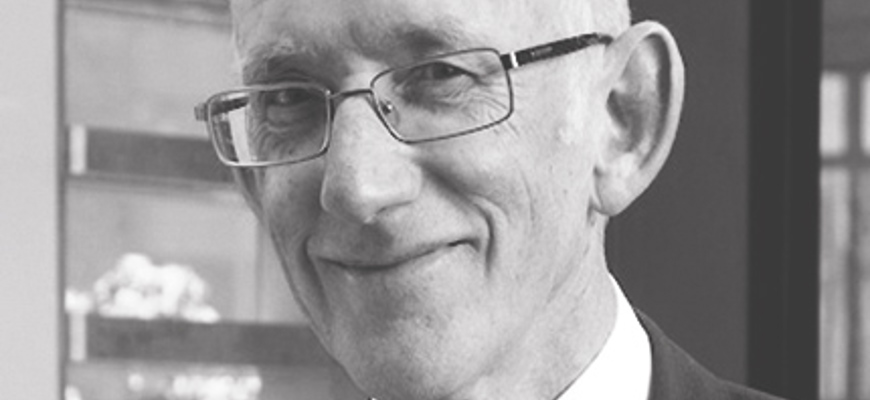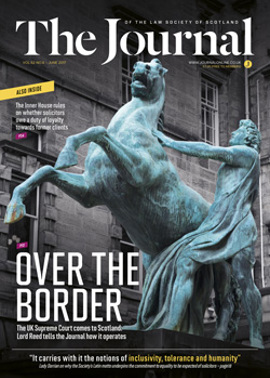Profile

First, congratulations on being awarded lifetime Honorary Membership of the Society. What did that mean to you?
I was stunned, and still am. Ours is at the same time the most combative and caring, most competitive and mutually supportive of professions. This, from the elected governing body of our profession, has touched me at a deeper level than any other accolades that I have been fortunate to pick up. That is a mark not only of personal achievement, but the remarkable achievements over the years of the Society’s Mental Health & Disability Subcommittee (“MHDC”) in particular, and of Scots mental health and adult incapacity law – as world leaders in the field – generally.
What made you pursue a career as a solicitor?
I had no particular aptitude for one school subject above others. Between two final-year preliminary examinations I worked hardest at the weakest, and reversed their order. Close to the deadline for applications, a family friend asked whether I had thought of the law. I hadn’t. I did. I applied. That was 56 years ago. Of course there have been tough times, especially when my senior partner, a fine and wise lawyer, died just over a year into our partnership and I became solely responsible for the practice at the age of 24. But never once have I regretted my choice of profession.
Why did you decide to join a committee?
I didn’t! I was invited to join a mental health working party, which quickly became MHDC with me as convener. A youthful Michael Clancy was our secretary. I made him promise to tell me when it was time to step down, before others started to think that. Michael forgets nothing: otherwise I would have assumed that he must have forgotten!
Have your perceptions of the Society changed since you joined the committee?
The Society has changed. My perceptions have followed that. In particular the move to Atria One was the right thing at the right time. It is a place where ordinary members can feel at home and listened to. The move signalled the beginning of a major transformation which is still work-in-progress.
What have been the highlights for you personally?
I cannot separate the personal from the collective. MHDC hosted the invitation seminar that launched consultation on adult incapacity law reform, then provided most of the members of the steering group for the fantastic alliance campaign which achieved our Incapacity Act as the first major legislation of our then brand-new Parliament. MHDC was main driver behind the “Consensus for Change?” conference in 1995, which in one day created unstoppable momentum for mental health law reform. MHDC pressed for protection of vulnerable adults, and in particular was responsible for the concept of powers to remove risk from the adult, rather than always removing the adult from risk. This resulted in our Adult Support and Protection Act, still not yet replicated in England & Wales. The sheer energy and commitment at every MHDC meeting makes each one a highlight: it is still the case that the majority of textbooks ever written within MHDC’s scope have been authored or co-authored by past or present members, and the remarkable cooperative spirit of the committee is reflected in the fact that our members have co-authored in at least seven different combinations.
Many of the purely personal highlights remain private to the people with intellectual disabilities and those close to them at the centre of each. I can mention persuading the Court of Session in 1986 to renew tutors-dative to provide a truly modern form of personal guardianship; and to revive tutors-at-law in 1992. Recent highlights have been the appointment by the Council of Europe in January 2016 to carry out a Europe-wide review of implementation of the Council’s recommendation on powers of attorney and advance directives; the research and authorship which led to the influential Three Jurisdictions Report on compliance with the UN Disability Convention, published in May 2016; and last autumn addressing audiences of 400+, then 700+ as keynote speaker at the opening plenary sessions of the World Adult Guardianship Congress and Alzheimer Europe’s Conference. Much longer ago, I still treasure having given the Law Society of Scotland’s first ever videoconferenced seminar.
What are the main issues that you think the committee has to address at the moment?
The current comprehensive review, and forthcoming reform, of our adult incapacity, mental health, and adult support and protection law, largely triggered by MHDC, in which MHDC is working closely with Scottish Government.
What has been the most surprising aspect of your work as a committee member?
To discover that Scots law, standing astride civil law and common law systems, is so highly regarded internationally; and to see and experience the extent that within the scope of MHDC’s work we are seen and sought after as world leaders.
What are you most looking forward to as part of the Society’s new strategy?
The ever-improving culture of cooperation, joint striving for excellence, and effective delivery of results among all the many committees and departments of the Society.
What’s your top tip for new lawyers?
Be ready for significant change from now on. Stay new, retaining the outside view with which you entered the profession, leading not following change, and staying close to leading developments beyond your own specialism, and in other professions.
If you could change only one thing for your members, what would it be?
That would be a complete reversal of present legal aid policies which seem designed to drive even the most committed lawyers out of legally aided work, to drive down standards of communication and service below the minimum acceptable, and above all to violate our fundamental human rights obligations by depriving the most vulnerable in society of the support needed to ensure adequate exercise and safeguarding of their rights, welfare and interests.
What keeps you busy outside of work?
I no longer work! My work-related hobby has become my retirement hobby, still splendidly supported by my firm TC Young. My other main activities are less sedentary. I run, cycle and canoe. I enjoy mountains and wild places, particularly ski-touring in winter: every year I join a group of Norwegian friends for a hut-to-hut ski trip in their mountains. I am the navigator!
If in addition you wanted to ask what kept me busy outside work when I did work, other activities included (1) rowing up to international standard, coaching and managing internationally, and being founder president of Castle Semple Rowing Club, which introduced a new sport to its community and went on to win Commonwealth silver and British Championships; (2) running marathons (under three hours at best) and other events, including Highland Cross eight times (winning section once) in aid of various charitable causes; (3) founder chair of Renfrewshire Association for Mental Health, which as RAMH still thrives; (4) chair of Paragon Ensemble through a period of major development (and included producing the first recording of a work by James MacMillan); (5) secretary to the 1990 European Special Olympics Summer Games; (6) NHS Trust chair for five years in the 1990s, including carrying through successfully the first merger.
In this issue
- Neutrality policies in commercial companies
- Court IT: the young lawyers' view
- Human rights: answering to the UN
- Galo and fair trial: which way for Scotland?
- Secondary victims in clinical negligence
- Reading for pleasure
- Opinion: Alan W Robertson
- Book reviews
- Profile
- President's column
- Twin tracks to completion
- People on the move
- Court of the nations
- Second time around
- How to avoid a summer tax scorcher
- Humani nihil alienum: a call to equality
- Sheriff commercial procedure: count 10
- Taking a pay cut: fair to refuse?
- Fine to park here?
- Enter the Bowen reforms
- Home grown
- Limited partnerships: a new breed
- Salvesen fallout: the latest round
- Gambling in football – the Scottish perspective
- Scottish Solicitors' Discipline Tribunal
- Changing sides
- Business drivers
- CCBE comes to Edinburgh
- "Find a solicitor" gets an upgrade
- Law reform roundup
- Thoughts on a frenetic year
- Check those bank instructions
- Fraud alert – ongoing bank frauds identified
- AML: sizing up the risk
- Master Policy Renewal: what you need to know
- Without prejudice
- What's the measure of a ruler?
- Ask Ash






